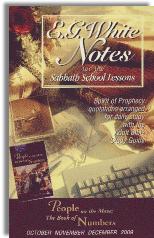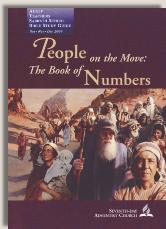|
||||||||||||||
Commentary on "From Complaints to Apostasy"
Day 2: Sunday, October 25, 2009
Today’s lesson is titled The Sin of Ingratitude. It is true that throughout the history of God’s people, many have been worse than thankless in the face of what God has accomplished and is accomplishing for them. The grumbling and complaining of mankind began in Eden with much finger-pointing, and the New Testament reveals that at the end of time men will be “lovers of themselves...malicious gossips...haters of good...holding to a form of godliness but denying it’s power...always learning, but never able to come to a knowledge of the truth.” (2 Tim. 3:1-7)
The first question for today’s lesson is not really answered by the text one is asked to read. Numbers 11 is not “tell[ing] us about the importance of not forgetting how the Lord has led us in the past” (Pg. 54 in the Teacher’s Quarterly.) This story is about: 1, the greediness of the people; 2, the anger of the Lord; 3, the intercession of Moses; 4, the burden of Moses and the Holy Spirit being shared with/placed upon the seventy elders; 5, the “blessing” of the quail; and 6, the severe plague, resulting in the deaths of the greedy Israelites. Before asking the question of why we should remember how God has lead in the past, we must first ask what is being taught in this passage of scripture.
Numbers 11 teaches us these things: 1, there are greedy people among the people of God; 2, greediness is a sin that angers the Lord; 3, Moses, as a type of Christ, intercedes for the people; 4, God is willing that believers should share in carrying the burden’s of fellow believers; 5, when we receive the desires based in our greediness, our fleshly natures, we suffer; and 6, God will have his vengeance upon the rebellious.
The second question, “How do we understand the Lord’s reaction to the Israelites?” is almost a diversion. If the Bible is true, its words are true. When scripture says that the anger of the Lord burned against the people (Num. 11:33) it literally means that the Lord was extremely angry with the people. When scripture says that the Lord struck the people with a severe plague, it means exactly that. We must not attempt to explain that away by saying, “This is just a human way of explaining the natural consequences of greediness.” That would be taking away the power and glory of the Lord, and giving that power and glory to nature, which in effect is pantheism. When we explain the works of God by giving them natural, rather than supernatural relevance, we demote God, which is a very serious problem. It is not so much the Lord’s reaction that we must understand, it is our fallen nature and our great need of the sacrifice of Christ and his intercession for us that we must understand.
Gluttony, a Form of Greed
The third question for today’s lesson is virtually irrelevant. The problem is much more than controlling our appetites. Where does our joy in the Lord, our acceptance of his discipline, our longing to see him face to face, come from if not from the heart? It is not a question of controlling our appetites; it is a question of who we are depending on for our strength, endurance and joy. If we are depending on ourselves, then our appetite will rage out of control, not just on overeating, but on being picky about what is put before us (which is also a type of gluttony.) If we are relying on the Holy Spirit and his moment-by-moment leading in our lives, we will be much better equipped to face the daily problems before us because he has been poured to overflowing in our hearts. That is the only solution to the grumbling and complaining, not attempts at controlling this particular sin or that, but being led by the Spirit in our hearts, not by letters engraved in stone. (See, 2 Cor. 3:3)
Although not specifically identified in the passage before us, the author is showing a side of gluttony (a form of greediness) that is rarely identified. He spends time explaining how the manna that God provided could be made in many different and tasty ways. The Adventist overemphasis with the “health message” is actually a decision to avoid what God has actually provided for food, according to New Testament, and is a form of gluttony that divides believers, allows some believers to think they are healthier than other human beings (we are all sick, not one is righteous), is offensive to others, but most of all is offensive to God. This offense to God is most evident when someone is presented with a wonderful meal, which cost someone much time and expense, but is refused due to “principle” or “letters written in stone.”
As believers, let us not be concerned with meat and drink. Those who condemned Jesus were concerned with such things. Luke 7:34-35 quotes Jesus as saying, "The Son of Man has come eating and drinking, and you say, 'Behold, a gluttonous man and a drunkard, a friend of tax collectors and sinners!' 35 "Yet wisdom is vindicated by all her children." Christians who partake of these things must not be condemned by those who do not, and vice versa.
Let us rejoice that although we were once counted among these complainers and “murmurers of evil” we have received Christ, been filled with his Holy Spirit, and can now live at peace with God and with fellow Christians.
Summary
- Numbers 11 is not about remembering how the Lord has led in the past.
- Numbers 11 teaches us that greed is an offensive sin which angers God, that Moses (as a type of Christ) intercedes for the people, that we, filled with the Holy Spirit, must help bear the burdens of others, and that the Lord will exact his vengeance on the unrepentant.
- The words of scripture must be taken as they are written.
- We must never attempt to explain the anger or wrath of the Lord as natural consequences of sin, but recognize them as supernatural acts of a holy and righteous God.
- When we explain God’s acts as natural consequences, we may be guilty of pantheism (giving the attributes of God to nature.)
- Allowing the health message to have significance in our lives constitutes a form of gluttony – pickiness.
- We must rejoice that we have been delivered from among the murmurers of evil into the peace of the body of Christ and filled with his Spirit.
GO TO DAY 3
Copyright 2009 BibleStudiesForAdventists.com. All rights reserved. Revised October 22, 2009. This website is published by Life Assurance Ministries, Glendale, Arizona, USA, the publisher of Proclamation! Magazine. Contact email: BibleStudiesForAdventists@gmail.com.
The Sabbath School Bible Study Guide and the corresponding E.G. White Notes are published by Pacific Press Publishing Association, which is owned and operated by the Seventh-day Adventist church. The current quarter's editions are pictured above.
Official Adventist Resources
Standard Edition Study Guide Week 5
Teacher's Edition Study Guide Week 5
Easy Reading Edition Study Guide Week 5
Search the Complete Published Ellen G. White Writings


